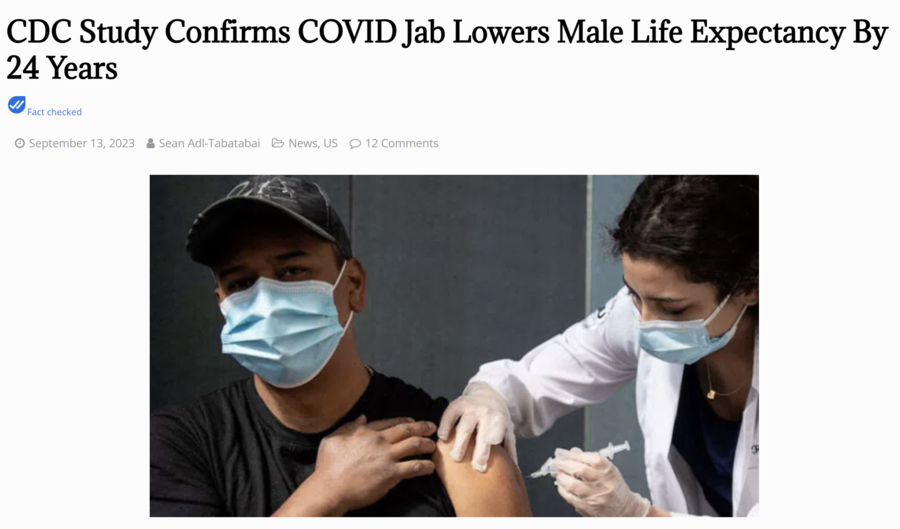STORY UPDATED: check for updates below.

Did a study conducted by the Centers for Disease Control and Prevention (CDC) confirm that men who receive COVID-19 vaccines "will tragically suffer a 24-year loss in their life expectancy"? No, that's not true: Dr. Nabin Shrestha, an infectious disease expert and one of the cited study's authors, told Lead Stories that such claims are "clearly misleading" and do not authentically characterize the research. Furthermore, this study was not conducted by the CDC. The articles making this claim also cited a third-party analysis of all-cause mortality death data compiled by the CDC and the U.K. Office of National Statistics (ONS).
A version of the claim originated in a post published by The People's Voice on September 13, 2023, titled, "CDC Study Confirms COVID Jab Lowers Male Life Expectancy By 24 Years" (archived here). It began:
An official new study has confirmed that men who receive the Covid vaccine will tragically suffer a 24-year loss in their life expectancy.
Scientists have analyzed the official data from the U.S. Centers for Disease Control and Prevention (CDC) and the UK government to determine the long-term harms of mRNA jabs.
The study aimed to weigh the balance of risk for the vaccines by calculating how long the negative side effects of mRNA vaccines take to reduce over time after a person receives each dose.
Below is how the post appeared at the time of writing:
(Source: The People's Voice screenshot taken Thurs Sept 14 20:20:00 UTC 2023)
Similar versions of the claim were reposted by Expose News and Slaynews.com. The articles appear to misconstrue two sources of information: a so-called "CDC study" and Shrestha's research.
A CDC spokesperson confirmed to Lead Stories that there was no such study conducted by the health agency, writing in an email received on September 19, 2023:
The study in question is not done by CDC, nor is it based on CDC data. It was done by the Cleveland Clinic. This study addresses only the risk of infection, not the risk of mortality. Also, the CDC's all-cause mortality data does not show that vaccinated people die at a higher rate. The all-cause mortality data do not distinguish at all between vaccinated and unvaccinated decedents.
Lead Stories also spoke with the lead study author, Shrestha, who confirmed that such claims are not an accurate reflection of their research.
No such study was conducted by the CDC
Shrestha wrote to Lead Stories in an email received on September 18, 2023, that he was not aware of any CDC study that showed that "... every vaccinated person becomes more and more likely to die at a rate of seven percent per dose, per year," which appears to be the basis of the calculations presented in the story.
"As a general rule, predictions are difficult, and predictions about health outcomes 20 or 30 years into the future are likely to have so much uncertainty that they are quite meaningless," he wrote. "The [People's Voice] story also has lines that are clearly misleading, an example being, 'The study also found that the human body cannot recover from any amount of mRNA injections.' mRNA vaccines have not been around long enough for such a study to be done."
The articles cited Josh Stirling, an insurance research analyst who has made other false claims regarding COVID vaccinations.
In January 2023, Stirling claimed that "The more doses on average you have in a region within the United States, the bigger increase in mortality that region has had in 2022 when compared to 2021." Stirling supposedly analyzed data collected by the CDC and the United Kingdom's Office of National Statistics -- this was not a study conducted by either health agency.
This claim was then cited by The People's Voice.
COVID vaccines are not a categorical cause of death in U.S.
As Lead Stories has previously reported, adverse vaccine reactions are not a categorical cause of death recorded by health officials, and the vaccination status and records of deceased individuals are also not tracked.
The CDC National Center for Health Statistics (NCHS) tracks mortality statistics annually. Data published for 2022, for example, reported that the three leading causes of death were heart disease (699,659), cancer (607,790) and unintentional injury or accidents (218,064).
In 2021, the leading causes of death were also heart disease (695,547), cancer (605,213) and COVID (416,893)
Similarly, in 2020, the leading causes of death were heart disease (696,962), cancer (602,350) and COVID (350,831).
Overall, our data clearly show that people who are unvaccinated have a higher mortality rate overall.We're not saying that all the difference is necessarily caused by the vaccine though: people who are vaccinated differ from those who are unvaccinated, and these differences vary by age group.In children, and younger people, those who have received many doses of a vaccine tend to be in poorer health, and therefore have higher mortality (but this is not due to the vaccine).
Lead Stories also contacted the CDC and NCHS for further comment and will update this article accordingly.
Shrestha study showed 'bivalent vaccine is less effective against more recent strains'
People's Voice cited the Shrestha study titled, "Effectiveness of the Coronavirus Disease 2019 Bivalent Vaccine," which was published in the peer-reviewed journal Open Forum Infectious Diseases on April 19, 2023.
As Lead Stories wrote in August 2023, this study showed that the "bivalent vaccine is less effective against more recent strains" and that further research should be "done in other populations to see if the findings hold up."
"Our study did find an association of increased risk of COVID-19 with increasing number of vaccine doses. However, some of the [People's Voice] statements represent an over-interpretation of the findings," Shrestha wrote .
For example, the statement, "It can damage a person's immune system in a dose-dependent manner," and "This means the more doses that people receive, the more damage it will do to their immune systems," are not reasonable conclusions from the study, he wrote. "As for next steps, the association that was found in our study should be studied by other people in different settings to see if their findings are similar or different."
Lead Stories has debunked other false claims involving COVID, including that Pfizer employees in Australia received a special batch of imported COVID vaccines that were different from what the public was given; that a Pfizer manufacturing site in North Carolina "stocked with" COVID-19 vaccines was damaged by a tornado, and that Florida did officially classify COVID-19 mRNA vaccines as bioweapons.
Updates:
-
2023-09-21T18:00:12Z 2023-09-21T18:00:12Z Adds comments from spokesperson for the U.K. Office of National Statistics.


















